AACR-Novocure Tumor Treating Fields Research Grants
The AACR-Novocure Tumor Treating Fields Research Grants represent a joint effort to promote and support innovative research focused on Tumor Treating Fields (TTFields), which are intermediate frequency, low intensity, alternating electric fields that disrupt cell division in cancer cells. These grants are intended to provide a deeper understanding of the mechanisms of action of this novel anti-cancer treatment modality and to accelerate the development of new treatment strategies to advance therapeutic options for cancer. Funded research must be focused on the preclinical application of TTFields in cancer and may be basic or translational in nature.
2024 grantees
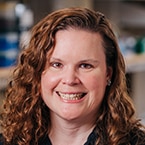
Research
Treatment for the deadly brain tumor glioblastoma (GBM) has been improved through the non-invasive addition of alternating electric fields, known as tumor treating fields (TTFields). Through kinomic profiling of temozolomide-sensitive and temozolomide-resistant GBM cells, the Hjelmeland and Willey laboratories identified kinases which are predicted to be impacted by TTFields. Addition of the kinase inhibitor crenolanib to TTFields was found to further decrease GBM cell growth. Dr. Hjelmeland seeks to expand these findings by characterizing additional kinase-mediated mechanisms of TTFields resistance and sensitivity in the context of GBM chemo- and radioresistance.
Biography
Dr. Hjelmeland obtained her doctorate in pharmacology and cancer biology from Duke University and completed a postdoctoral fellowship neuro-oncology, also at Duke University. She was on staff at the Cleveland Clinic before starting her laboratory at the University of Alabama at Birmingham (UAB). Dr. Hjelmeland is the Basic Science Co-Leader of the Neuro-Oncology Program of the O’Neal Comprehensive Cancer Center and Associate Professor of Cell, Developmental and Integrative Biology at UAB. Her laboratory is focused on identifying novel mechanisms promoting glioblastoma growth and therapeutic resistance that can be targeted to improve patient outcomes.
Acknowledgment of Support
“We sincerely appreciate the support from AACR and Novocure through the 2024 AACR-Novocure Cancer Research Grant. These funds will allow us to move forward with our efforts to identify blood brain barrier penetrant kinase inhibitors that improve the efficacy of TTFields in primary and/or recurrent GBM cells.”
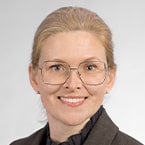
Research
Preliminary in vitro data have shown promising effects of Tumor Treating Fields (TTFields) on both morphological and functional aspects of the glioblastoma network. Dr. Ratliff aims to investigate the biological effects of TTFields on critical drivers of glioblastoma malignancy, with a particular emphasis on tumor microtube formation and the function and integrity of the glioblastoma tumor cell network. They plan to analyze these effects from morphological, functional, transcriptional, and metabolomic perspectives using glioblastoma brain organoids and in vivo chronic cranial window mouse models. In addition, her study builds on a recently established and clinically validated connectivity signature for glioblastoma, identified as a robust biomarker associated with the mesenchymal expression subtype, TP53 wild-type status, and poor patient survival. They plan to investigate the effects of TTFields on this connectivity signature and provide new insights into the potential of TTFields as a therapeutic strategy for glioblastoma.
Biography
Dr. Ratliff is a dedicated neurosurgeon with over a decade of experience in neuro-oncology. In addition to her medical training, she holds a graduate degree in biology, providing her with a strong foundation in molecular biology and scientific methodology. She received further training in the research group of Professor Winkler at the German Cancer Research Center (DKFZ), where she contributed to establishing a molecular focus and implementing intravital microscopy techniques. Dr. Ratliff has since established her own research group and laboratory at the University Medical Center Mannheim, Germany, benefiting from research associations that provide extensive resources and collaborative opportunities.
Acknowledgement of Support
“Receiving the 2024 AACR-Novocure Cancer Research Grant will allow me to investigate whether TTFields target the glioblastoma tumor cell network, a focus of several ongoing clinical trials. As a neurosurgeon, devoting more time to research fulfills my passion and advances my academic and scientific career.”
2022 Grantees
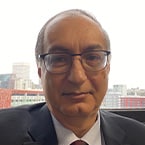
Research
The goal of the AACR-Novocure Award to Dr. Wafik El-Deiry at Brown University’s Legorreta Cancer Center is to develop novel therapy combinations that exploit pro-apoptotic pathways due to cell stress responses engaged by imipridones and TTFields. The team will evaluate alterations in signaling involving the integrated stress response and the p53 pathway, the extent of DNA damage, and the role of DNA damage response defects in tumor cell sensitivity to combination of TTFields and imipridone drugs using cultured tumor cells. In addition, in vivo studies will be conducted to assess the therapeutic potential of TTFields/imipridone in glioblastoma (in combination with temozolomide and radiotherapy), and in other solid tumors. Valuable mechanistic insights and findings on promising combinatorial strategies using TTFields and imipridones, can potentially be used in innovative clinical research protocols for patients with GBM and other deadly solid tumors.
Biography
Wafik S. El-Deiry, MD, PhD, FACP is an American Cancer Society Research Professor, and the director of the Legorreta Cancer Center of Brown University. He discovered p21(WAF1), the TRAIL receptor DR5, and ONC201/TIC10 as cancer therapeutic, and has published more than 400 manuscripts. He treats patients with advanced cancer and focuses on cancer drug resistance and drug discovery/ development. He is also the founder of Oncoceutics (acquired by Chimerix), p53-Therapeutics, and SMURF-Therapeutics.
Acknowledgment of Support
The 2022 AACR-Novocure Grant will allow our team of researchers to explore novel combination therapies with TTFields that involve therapeutic cell stress pathways for brain and other solid tumors. The award facilitates discovery science, mechanistic insights, and translational directions to evaluate biomarkers that can be incorporated into early-phase clinical trials.
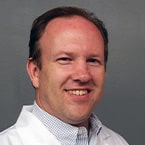
Research
Primary cilia can mediate signaling that promote glioblastoma growth and resistance to chemotherapy. Dr. Sarkisian’s group is exploring how TTFields affect cilia and vice versa. They have found that glioma cilia appear more sensitive than normal neural cell types to the effects of TTFields and may play a role in tumor cell recurrence when TTFields treatment is halted. In this AACR-Novocure project, they will use genetic tools and small molecule inhibitors to determine whether (1) altering ciliogenesis before or after TTFields improves TTFields cell killing and prevents tumor cell recurrence, and (2) altering ciliogenesis in patient tumors ex vivo enhances TTFields-induced cytotoxicity.
Biography
Dr. Sarkisian completed his doctoral degree in Physiology and Neurobiology at the University of Connecticut. He did postdoctoral training at Yale University in Neurobiology, and was recruited to the University of Florida Department of Neuroscience where he is currently an associate professor. He is also a member of the Preston A. Wells Jr. Center for Brain Tumor Therapy and the UF Health Cancer Center. His laboratory is interested in the biology of primary cilia during brain development and cancer.
Acknowledgment of Support
I am honored and grateful to receive the 2022 AACR-Novocure Tumor Treating Fields Research Grant. Without this support, our efforts to unravel the underlying cell biology disrupted by TTFields and develop new ways to predict and/or enhance sensitivity to TTFields, would not be possible.
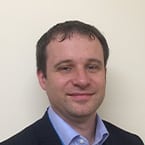
Research
Ion channels play a crucial role in the development and progression of brain tumors. Candidate ion channel genes (ICG) associated with the response to Tumor Treating Fields (TTFields) have been previously identified. In particular, Dr. Smith’s group observed that the SCNN1 family of sodium channels were significantly differentially expressed in glioblastoma (GBM) cells exposed to TTFields. In this study, they seek to assess the therapeutic potential of targeting SCCN1 channels in glioblastoma, including the possibility of combining this treatment strategy with TTFields.
Biography
Stuart Smith was awarded his medical degree at the University of Oxford, followed by Neurosurgical training in Oxford, Bristol, and Nottingham. He undertook his doctoral degree in pediatric GBM in Nottingham at the Children’s Brain Tumour Research Centre. He is currently a clinical associate professor of neurosurgery at Nottingham University Hospitals in the United Kingdom, with a specialist interest clinically and academically in brain tumors, particularly gliomas. His current research includes projects examining electrotherapy in intrinsic brain tumors in children and young adults, as well as studies examining surgical drug delivery to brain tumors and targeted surgical sampling to examine glioma heterogeneity.
Acknowledgment of Support
This award is hugely important to allow the investigation of promising therapeutic targets we have previously identified as synergistic with TTFields. The ion channels we are focused on are highly druggable targets and this grant will catalyze translation towards clinical evaluation, and we are extremely grateful for this opportunity.
2021 Grantees
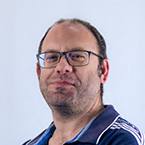
Research
DNA damaging chemoradiotherapy is standard of care treatment for post-surgical management of patients with glioblastoma. The recent discovery that TTFields modulates DNA damage response (DDR) processes presents a critical opportunity to develop more effective, rationally-designed TTFields-based therapeutic strategies. However, such strategies need to overcome extensive interpatient and intratumoural heterogeneity, which includes diversity in DDR processes and inherently treatment resistant glioblastoma stem-like cell (GSC) subpopulations known to upregulate key aspects of the DDR. Dr. Collis’s group has recently developed novel clinically and surgically relevant ex vivo glioma stem-like (GSC) models that reflect spatiofunctional heterogeneity and post-surgical residual disease. In this project, he aims to establish 1) whether functionally and spatially distinct glioblastoma cell populations liberated from patient tumors demonstrate differential responses to TTFields therapy and 2) universal therapeutic vulnerabilities amongst tumor subclones and vulnerabilities specific to difficult-to-treat populations.
Biography
Dr. Collis a molecular and cell biologist with over 20 years’ research experience in DNA damage response and genome stability. Following his doctorate at Cancer Research UK (CRUK)’s Paterson Institute, he carried out his postdoctoral training at the Johns Hopkins University and CRUK’s London Research Institute. In 2009, he established his own laboratory at the University of Sheffield and was subsequently awarded a prestigious CRUK Senior Cancer Research Fellowship. He is currently a reader in genome stability.
Acknowledgment of Support
The AACR-Novocure Tumor Treating Fields Research Grant will be instrumental in allowing us to further define how TTFields therapy interacts with the various subpopulations within tumors, as well as the postsurgical resistant stem cell niche responsible for tumor recurrence. This will help us to identify potential drug combinations that could further improve its clinical effectiveness.
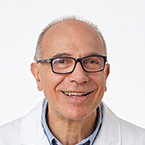
Research
Although Tumor Treating Fields (TTFields) have shown activity in combination with standard chemotherapy in mesothelioma (MPM) patients, the molecular mechanisms which elicit these effects have not been fully elucidated. Based on his preliminary data, Dr. D’Incalci is set to investigate whether the sensitivity of MPM to TTFields is related to down-regulation of genes/pathways involved in cell cycle regulation, cell survival, and DNA repair. Mechanistic insights can help identify synergistic combinations of TTFields with specific chemotherapeutics. Using drugs currently used to treat MPM or those with a mechanism of action which hints at potential additive or synergistic effects with TTFields (such as DNA repair inhibitors like PARP inhibitors, inhibitors of cell cycle checkpoints and mitosis as well as epigenetic modulators including BET inhibitors), Dr. D’Incalci aims to identify drugs that can synergize with TTFields in vitro and in vivo.
Biography
Dr. D’Incalci obtained his medical degree cum laude from the University of Milan. He then specialized in pharmacology and in oncology. He subsequently worked in the Molecular Pharmacology Laboratory of the National Cancer Institute. He has been chief of the Cancer Chemotherapy Laboratory and of the Oncology Department at the Mario Negri Institute, Italy. Currently, he is a professor at the Humanitas University and head of the Cancer Pharmacology Laboratory at the Humanitas Research Hospital.
Acknowledgment of Support
The AACR-Novocure Tumor Treating Fields Research Grant will allow my research group to investigate the mode of action of TTFields and to identify mechanism-based effective combinations of TTFields with antitumor drugs against malignant pleural mesothelioma potentially applicable in the clinic.

Research
Residual disease in glioblastoma has been difficult to detect. Dr. Piccirillo previously contributed to the development of a multiple-sampling scheme that allows objective identification of the residual disease in the sub-ventricular zone (SVZ) of glioblastoma (GBM) patients. Her work revealed that in 65% of cases the SVZ contains treatment-resistant cancer stem-like cells. Thus, investigating residual disease in this area may hold the key to developing a valid therapeutic target for many patients. In this study, Dr. Piccirillo and her research group are set to examine the impact of Tumor Treating Fields (TTFields) on treatment-resistant cancer stem-like cells isolated from the SVZ of GBM patients using single-cell transcriptomics and functional phenotyping analysis.
Biography
Dr. Piccirillo received her doctoral degree in translational and molecular medicine from the University of Milan-Bicocca, Italy. She pursued postdoctoral training at the University of Cambridge, U.K. She is currently a tenure-track assistant professor in the Department of Cell Biology and Physiology at the University of New Mexico Health Sciences Center, and a full member of the Comprehensive Cancer Center.
Acknowledgment of Support
I am extremely honored to receive the 2021 AACR-Novocure Tumor Treating Fields Research Grant. This support will provide us with the necessary resources to examine the impact of TTFields on mechanisms contributing to the ability of cancer stem-like cells to overcome treatment and seed the recurrent tumor in GBM patients.
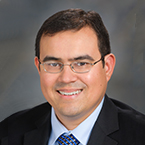
Research
Dr. Tatsui’s group aims to investigate the therapeutic potential of tumor treating fields (TTFs) in 3D cultures derived from cell lines and fresh surgical specimens of spinal metastasis. His group plans to 1) identify the most effective inhibitory frequencies for different types of spinal tumors, 2) evaluate if increased electrical conductivity induced by metal improves the antiproliferative effect of TTFs, and 3) validate the most effective inhibitory TTF frequency in vivo.
Biography
Dr. Tatsui obtained his medical degree at Federal University of Parana, Brazil. He completed clinical fellowships in complex spine reconstructive surgery at the University of Miami and in neurosurgical oncology at the MD Anderson Cancer Center. He currently holds the position of associate professor in the Department of Neurosurgery at MD Anderson Cancer Center. His practice and research focus on the development of innovative treatments for patients suffering from spinal metastasis.
Acknowledgment of Support
I am very grateful to receive the 2021 AACR-Novocure Tumor Treating Fields Research Grant. Tumor growth remodels the bony microenvironment, creating changes in tissue anisotropic properties thus far never explored in the context of TTFields application. This research support will allow build up knowledge to develop new treatment strategies for spinal metastasis.